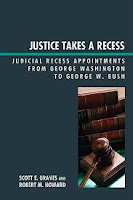National Poetry Month has been around since 1996 when the Academy of American Poets designated April as the month for schools, publishers, libraries, booksellers, and poets to celebrate poetry and its place in American culture. This April, the Academy of American Poets is celebrating the role that correspondence has played in poets' lives, as well as in their poems. Brooklyn Law School has just such an item in its collection with Calamus: A Series of Letters Written during the Years 1868-1880 by Walt Whitman to a Young Friend, Peter Doyle (Call # LC1059 .A73). One quotation from that book is “I delivered my poem here before the College yesterday. . . I am to go to Vermont for a couple of days, and then back to Brooklyn. . . I will send you the little book with my poem, (and others) when I get back to Brooklyn.”
For law-related poetry, take a look at Supreme Court Haiku by Houston attorney Keith Jaasma who creates haiku poems featuring the decisions of the US Supreme Court. Seed for example the haiku for Moncrieffe v. Holder in which the Court ruled that a non-citizen cannot be automatically deported for the kindhearted but illegal act of bringing a few joints to a party. The haiku reads:
Immigrant’s drug crime
“Aggravated felony”?
No, just a few joints
The three line poems that Japanese poets write, usually about nature, are very witty. There are also haiku about the Constitution and various justices. The FAQ movie on the site is worth watching.




